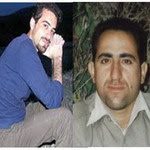ADNAN HASSANPOUR
“This sentence is absurd and baseless,” Reporters Without Borders said. “One day, this journalist is sentenced to death. Two years later he gets a ten-year sentence. We reiterate our call for his immediate release.”
Kurdish journalists Adnan Hassanpur
The death sentence was passed on Hassanpour on 16 July 2007 by a revolutionary tribunal in Mariwan, in Iran’s Kurdistan northwestern region (Eastern Kurdistan), which found him guilty of subversive activities against national security, espionage and separatist propaganda.
After first confirming the sentence on 22 October 2007, the supreme court in Tehran quashed it in August 2008 on procedural grounds. It said Hassanpour could not be regarded as “mohareb” (and enemy of God).
The case was returned to an ordinary court in Sanandaj for retrial. After hearing the case on 6 September 2008 and 30 January 2009, the court issued its sentence Wednesday. Hassanpour, who has staged two hunger strikes in protest against the conditions in which he is being held, www.ekurd.net is currently in the main Sanandaj prison.
Aged 27, he was arrested outside his home on 25 January 2007, and was initially imprisoned in Mahabad, which is also in Iranian Kurdistan. He wrote about the very sensitive Kurdish issue for the magazine Asou, which has been banned by the Ministry of Culture and Islamic Guidance since August 2005. He also worked for foreign media such as Voice of America and Radio Farda, which broadcasts in Farsi to Iran.
• November 9th 2007- Supreme court decision upholding death sentence for Kurdish journalist should be “taken seriously”
Reporters Without Borders today condemned the supreme court’s decision to uphold the death sentence for Kurdish-Iranian journalist Adnan Hassanpour for “spying.” The ruling was issued on 22 October but was not revealed until this week.
The court quashed the conviction of another journalist convicted in the same case, Abdolvahed “Hiva” Botimar, on the grounds of procedural irregularity. Botimar had also been under sentence of death.
“We have been waiting for than six months for the supreme court to decide whether to reopen the case against Iranian-Canadian journalist Zahra Kazemi’s alleged murderers, but it took the court only a few weeks to uphold Hassanpour’s death sentence, so the judicial system clearly continues to have a pro-government bias,” Reporters Without Borders said.
“We appeal to the international community to take every possible action to get this journalist released,” the press freedom organisation added. “This sentence should be taken very seriously as Iran has already executed more than 300 people since the start of the year.”
Saleh Nikbakht, one of the lawyers representing the two journalists, was notified on 5 November of the court’s decision although he was not given the details of the ruling. He said Hassanpour had been found guilty of “espionage” because he had allegedly “revealed the location of military sites and established contacts with the US foreign affairs ministry.”
He added that the court overturned Botimar’s conviction on the grounds of a “procedural irregularity,” and sent his case back to the same revolutionary court in Marivan (in the Kurdish northwest of Iran) that convicted him and Hassanpour on 16 July on charges of spying, “subversive activity against national security” and “separatist propaganda.”
Nikbakht told Reporters Without Borders: “This sentence is not only contrary to the Universal Declaration of Human Rights and the international conventions ratified by Iran, but it also contrary to Islamic law and the laws of the Islamic Republic.”











